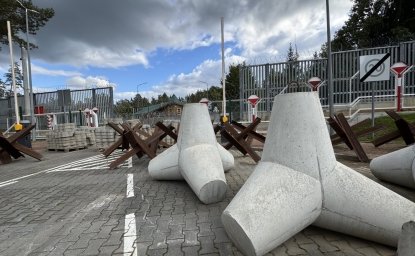What to Do in Iraq
What should the U.S. do now in Iraq? Former Congressman Lee Hamilton offers some thoughts for moving forward.
What should the U.S. do now in Iraq? Former Congressman Lee Hamilton offers some thoughts for moving forward.
What should we do now in Iraq? That is the question many Americans are asking, even as the debate about decisions made over the last three years intensifies. The problem is there are few good options.
The United States faces a hard road ahead. Pulling out precipitously could cause considerable damage to U.S. interests, with Iraq descending further into civil war, violence spilling into neighboring countries, Iran strengthening its position through its relationship with Iraqi Shiites, and U.S. credibility taking a severe blow. Yet simply staying the course does not rule out the above scenario, and staying the course ensures the continued death and maiming of American soldiers, huge costs to a strained U.S. treasury and overstretched military, and the persistence of a potent terrorist recruiting tool.
Meanwhile, public opinion is beginning to play its part. Poll after poll shows that a majority of Americans have soured on the intervention in Iraq. Pressure is mounting to find a way out, and that pressure will build as the 2006 congressional elections draw nearer. A war of choice like the Iraq war cannot be sustained over time without public support. In the coming months, we can expect to hear more political voices saying: "We have given the Iraqis an opportunity; they need to take responsibility for their own security. It is time to leave."
So what is needed to afford the U.S. the opportunity to leave Iraq to Iraqis without leaving behind disaster? The answer is consensus among three seemingly contradictory positions. Iraq's Kurds want quasi, if not formal, independence in northern Iraq. Iraq's Shiites want a unified, democratic Iraq that enables their strong majority to play a leading role. Iraq's Sunnis want their interests protected in a united Iraq with a strong central government, and resent their loss of prominence in the nation's political and economic life.
The U.S. must intensify its efforts to facilitate consensus among these three groups that avoids an all-out civil war. To begin with, that means lowering expectations. Iraq is not going to be a shining American-style democracy, setting off democratic dominoes across the Middle East. Nor is U.S. action in Iraq going to be a silver bullet that somehow eradicates terrorists and their grievances, thus preserving us from danger here at home.
The acceptable and reachable goal is a stable, united, federal Iraq. The recent Constitutional referendum was a step forward in reaching that goal, as were the January 2005 elections. But no one election, or Constitution, or counter-insurgency strike, or trial of Saddam Hussein, is going to get us to a successful outcome in Iraq. Too often, we have rushed to herald a breakthrough or victory. Reality demands more patience: success can only be met through persistent mediation among Iraq's factions, joined with aggressive diplomacy, targeted military action, and economic reconstruction.
This is a great challenge for American foreign policy. Within Iraq, we must persuade Shiites, Sunnis and Kurds that their interests can be best met by working together through a federal system with a credible central government. Within the region, we must do more to enlist the support of political and religious leaders, particularly in bridging the Sunni-Shiite divide, and convincing Iraq's Sunnis to work through a peaceful, political process. Within the broader international community, we must seek more support for the new Iraqi government.
As for our military commitment, we should seek an orderly withdrawal of U.S. forces over time. Arbitrary deadlines will not work; indeed, they will only cement the impression of a failing military occupation, rather than a systematic transfer of power and responsibility to Iraqis. Our troops must accelerate the training of Iraqis, foster an environment in which Iraqi forces are motivated to succeed, and help provide security to support an emerging political settlement. They will not be able to defeat the insurgency wholly: the goal should be diminishing the insurgency to the point that it is possible to leave Iraqis in charge of fighting it. Meanwhile, we must make clear that we are not interested in a long-term presence in Iraq through military bases or control of Iraqi oil.
It is too early to write off Iraq as a strategic disaster; the future is still in doubt. There is indeed a chance that we will suffer a terrible outcome, but there is also hope for a stable, unified, federal Iraq. We should not walk away, nor should we blindly stay the course. We must readjust our expectations for what can be achieved; redouble our efforts to facilitate a political consensus to Iraq's divisions; and gradually reduce our military commitment.


